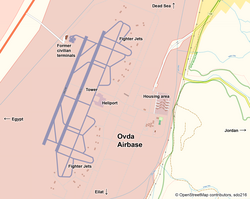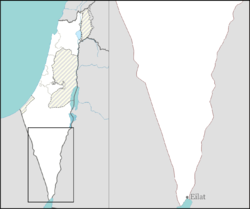Ovda Airbase
| Ovda Israeli Air Force Base Air Force Base 10 | |||||||||
|---|---|---|---|---|---|---|---|---|---|
בסיס עובדה | |||||||||
| Uvda, Southern District in Israel | |||||||||
 | |||||||||
| Coordinates | 29°56′19″N 34°56′13″E / 29.93861°N 34.93694°E | ||||||||
| Type | Airbase | ||||||||
| Site information | |||||||||
| Owner | Israel Defense Forces | ||||||||
| Operator | Israeli Air Force | ||||||||
| Site history | |||||||||
| Built | 1981 | ||||||||
| In use | 1981–present | ||||||||
| Airfield information | |||||||||
| Identifiers | IATA: VDA, ICAO: LLOV | ||||||||
| Elevation | 455 metres (1,493 ft) AMSL | ||||||||
| |||||||||
Ovda Airbase (Hebrew: בסיס עובדה, English: fact) is an Israeli Air Force (IAF) base, located in the very south of Israel, around 40 kilometers north of Eilat, in a large plain of the southern Negev desert. It has two runways with lengths of 3,000 and 2,600 meters and a heliport. There are currently (2024) no operational fighter jets or helicopters stationed there, but the so-called "Aggressor Squadron" for pilot training. The international military aviation exercise Blue Flag takes place there every two years.[1]
History
In March 1949 – 8 km northwest to the current base – a temporary airfield was set up during Operation Uvda to secure the southern Negev against Jordan shortly before the end of the First Arab–Israeli War.
In 1981 Ovda (Uvda) was opened as a military airbase – a replacement for the Etzion Airbase and others on the Sinai Peninsula, abandoned after the Camp David Accords (see map below).
From 1982 onwards it was also used as Ovda Airport for civil charter flights and from 1988 to 2019 for regular scheduled flights by holidaymakers from Europe who wanted to get to the seaside resort of Eilat on the Gulf of Aqaba.
On 31 March 2019, the civilian part was closed, because the new Ramon Airport had now gone into operation, which is also much closer to Eilat.[2]
-
Map of Operation Uvda in 1949 with a temporary airfield in the southern Negev desert
-
IAF bases abandoned on the Sinai Peninsula (red) and newly built in southern Israel (blue)
-
The first terminal of Eilat-Ovda Airport in 2006
-
The new terminal of Ovda Airport, which was closed again on 31 March 2019
-
The Badge of Ovda Airbase aka Airbase 10
In March 2005, the 115 Aggressor Squadron "Flying Dragon" was brought back to life on Ovda. At this point it was flying both F-16A/B Netz jets and AH-1 Cobra Tzefa attack helicopters. Their task is or was to simulate enemy jet or helicopter attacks and especially their tactics in order to create the most realistic scenario possible in real combat. The squadron also includes a surface-to-air unit that simulates enemy air defense systems.[3]
The squadron is not intended for operational missions, although the pilots are trained fighter pilots and the jets are operational machines. Similar to the USAF, the squadron also offers this training service to other nations.[4]
In 2013, all AH-1 Cobra attack helicopters of the IAF were decommissioned, including those based at Ovda. In April 2017, the Aggressor Squadron's older F-16A/B jets were replaced with newer used F-16C/D Barak.[5][6]
-
An older F-16A Netz of 115 Aggressor Squadron "Flying Dragon" in 2013
-
A now retired AH-1 Cobra Tzefa attack helicopter of the IAF
-
Older badge of 115 Squadron "Flying Dragon"
Blue Flag
Since 2013, the international military aviation exercise Blue Flag has taken place on Ovda every two years in the fall, for which several Western countries send their pilots and fighter jets to Israel, where they undergo intensive training, which also includes the 115 Squadron "Flying Dragon" of the IAF with its role as aggressor. In addition to the air forces directly involved, numerous observers from other countries are also regularly present.[7]
Units
- 115 Aggressor Squadron "Flying Dragon" – operating F-16C/D Barak[6]
- IAF Ground Staff School
- IAF Officers' School
-
An F-16C Barak of the 115 Aggressor Squadron "Flying Dragon" in Januar 2021
-
Two Israeli pilots in front of their F-16C jets of 115 Squadron at Ovda in October 2021
-
Current badge of 115 Squadron "Flying Dragon"
Note: IAF aircraft can usually be assigned to their squadron by the symbols on the tail
See also
References
- ^ "Ovda (Uvda / Ouvda) – Israel Airfields". GlobalSecurity.org. Retrieved 2023-10-28.
- ^ "Eilat Ramon Airport Guide". Ramon-Airport.com. Retrieved 2023-10-28.
- ^ Pfeffer, Anshel (September 19, 2010). "Flying Dragons simulate the enemy for Israel Air Force pilots". Haaretz. Archived from the original on 2010-09-21. Retrieved 2010-09-20.
- ^ Aloni, Shlomo (2010-09-01). "Israeli Reds". Air Forces Monthly (269).
- ^ "IAF Grounds Apache Fleet after Fatal Crash". Israel Defense. 2017-08-08. Retrieved 2020-05-05.
- ^ a b "The "Red" Squadron has Integrated the "Barak"". IAF Website. 2017-04-04. Retrieved 2023-10-01.
- ^ "Cooperation over competition: Eight nations fly in Israel's largest-ever air drill". defensenews.com. 2017-11-09. Retrieved 2023-09-25.















